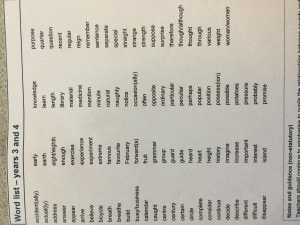06 May 2016
This week’s spellings are all homophones. Homophones are two or more words that sound the same but are spelt differently and mean different things. For example: fair (a place with rides and games) and fare (the cost of public transport).
- grown / groan
- eight / ate
- woman / women
- heard / herd
Your child also needs to find their own pair (not pear!) of homophones which they will be tested on.
29 April 2016
This week’s spellings all have the ‘-ou’ digraph. These spellings all have ‘-ou’ making an ‘uh’ sound (as in touch and country) or ‘-ough’ making an ‘uff’ sound (as in enough).
young
touch
double
trouble
country
tough
rough
enough
cough
fought
These spellings will be tested next Friday. Why not go on spellodrome to practise your spellings?
22 March 2016
This week’s spellings end in ‘-sure’ and ‘-ture’.
measure
treasure
pleasure
enclosure
creature
furniture
picture
nature
adventure
Your child has nine spellings to learn and must find their own tenth spelling that ends in either ‘-sure’ or ‘-ture’. They will be tested on seven of these spellings and their own word next Friday.
25 March 2016
This week, your child has a word study to complete. They must find an A – Z list of words that follow the ‘double up for a short vowel sound’ spelling rule. For example, ‘apple’ and ‘attractive’ have a doubled-up letter to make the ‘a’ in front a short sound (compare the ‘a’ sound in ‘apple’ and ‘able’).
The words your child finds must be words that they feel they could use in their writing in class. I would encourage the use of a dictionary or even the use of an internet search engine. If your child is searching for words online, make sure you speak to them about being e-safe.
18 March 2016
This week, your child has been given a copy of the Year 3/4 spelling list. They must pick 10 spellings that follow the rule double up for a short vowel sound. Words that follow this rule include comma (compare the sound of the ‘o’ with coma, where there is no double up), hopping (compared with hoping) and funny. Why not ask your child to identify the short vowel sound in each of these words. 
11 March 2016
This week’s spellings all contain negative prefixes. Negative prefixes change the meaning of the root word to the opposite. Your child will need to be able to spell all the root words below and know which negative prefix can be applied (for example, misappear will count as an incorrect answer in Friday’s test). Your child only has the root words in their learning list but if they get stuck identifying which negative prefix to apply, they are as follows:
disappear
inconsistent
unfair
unhappily
unusually
infamous
misunderstand
disadvantage
mismatch
unjust
04 March 2016
 This week’s selling all have a negative prefix. This makes the new word mean the opposite of the root word (so untidy means messy, the opposite of tidy).
This week’s selling all have a negative prefix. This makes the new word mean the opposite of the root word (so untidy means messy, the opposite of tidy).
As well as the eight below, your child needs to find two more words with a negative prefix which they will be tested on on Friday.
- disappoint
- disagree
- disobey
- misbehave
- mislead
- misspell
- inactive
- incorrect
26 February 2016
This week’s spellings are all adverbs. Adverbs describe how a verb (an action) is being done.
sad sadly
usual usually
final finally
comic comically
happy happily
angry angrily
gently gently
simply simply
frantic frantically
dramatic dramatically
These spellings have all been formed by adding the suffix -ly or -ally to a root word. The meaning of the root word helps us to understand the meaning of the adverb. Take “running comically”. The root word of comically is comic, which means to be funny, so running comically would be running in a funny way.
Why not try spelling pyramids to help practise this week?
g
ge
gen
gent
gentl
gently
05 February 2016
The week’s spellings are all singular and plural possessives. We’ve been looking at the role of apostrophes in the contracted form (can’t…don’t…won’t) and are now focussing on how they are used to mark possession (the cat’s pyjamas are the pyjamas that belong to the cat).
For this spelling task we’re focussing on using ‘s for singular nouns (one cat’s pyjamas) and s’ for plural nouns (two cats’ pyjamas).
Your child needs to find five interesting nouns that link to our Life topic. A noun’s job is to name things, people or places. Once they have chosen five spellings, they must work out the singular and plural possessives for their nouns. Usually, adding an -s to the end of a noun will make it plural and all that is required is an apostrophe after that s to mark possession. However, some nouns have irregular plurals which must be learnt. For example, if a noun ends in a y you have to drop the y for an i and add es (like ‘ladies’ from last week’s list). Additionally, some nouns have even more unusual spelling rules for the plural (one sheep, two sheep; one cactus, two cacti). The best way to check this is to go onto the internet and search for your nouns plural e.g. cactus plural, sheep plural.
29 January 2016
The week’s spellings are all singular and plural possessives. We’ve been looking at the role of apostrophes in the contracted form (can’t…don’t…won’t) and have started to look at how they are used to mark possession (the cat’s pyjamas are the pyjamas that belong to the cat).
For this spelling list we’re focussing on using ‘s for singular nouns (one cat’s pyjamas) and s’ for plural nouns (two cats’ pyjamas).
one girl’s (…house – the house lived in by one girl)
two girls’ (…house – the house lived in by the two girls)
one boy’s
two boys’
one owl’s
two owls’
one ferret’s
two ferrets’
one lady’s
two ladies’